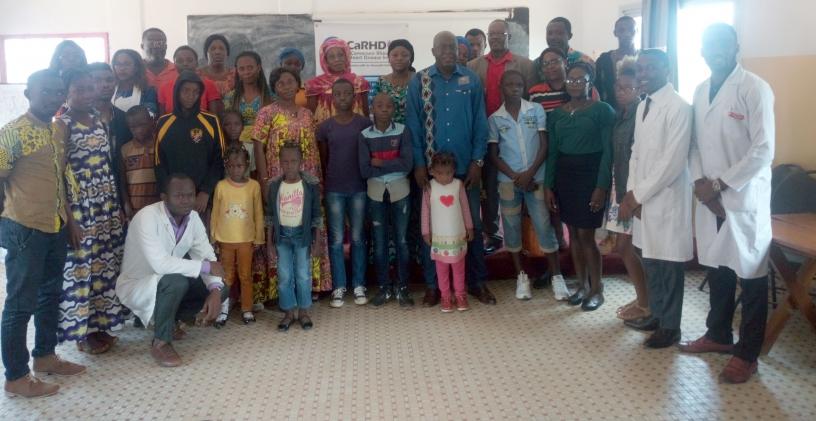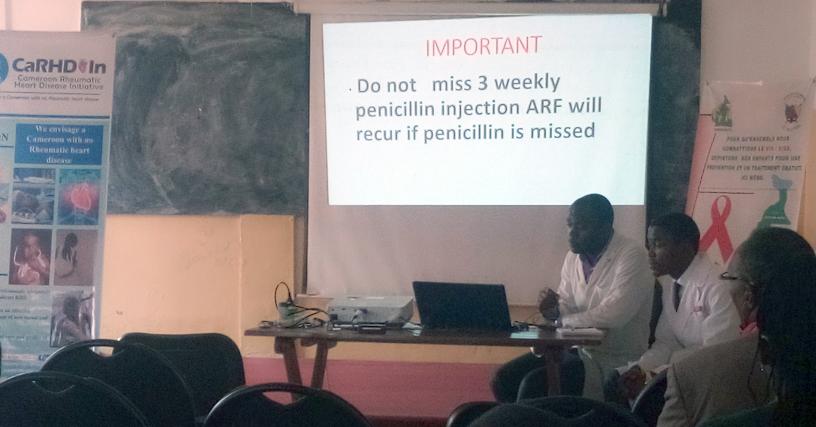Initiating a Rheumatic Heart Disease Clinic in Yaoundé, Cameroon

RHD Action Small Grant Project Title: Initiating a Rheumatic Heart Disease Clinic in Yaoundé, Cameroon
Project coordinator: Dr Yanwou Nathan
Project Team: Prof David Chelo, Dr Shu Beckly, Dr Njedock Nelson, Dr Wotol Maxime, Dr Nkoke Clovis, Mrs Azanfack Raissa (Nurse)
Cameroon, a country of just under 26 million people, is located at the convergence of Central and West Africa on the mid-Atlantic coast of the African continent. Cameroon’s official languages are French and English but 24 different African language groups are also spoken throughout the country. As a developing country, Cameroon struggles with an infectious disease burden compounded by the emergence of chronic diseases related to life-style.
Very little has been published about Rheumatic Heart Disease (RHD) and Acute Rheumatic Fever (ARF) in Cameroon1, 2, so the true prevalence of these conditions on a country-wide basis is unknown. A group of junior doctors in the capital city of Yaoundé knew they were seeing numerous cases of RHD in their paediatric clinics and felt that something must be done for these children and young people. Dr Yanwou Nathan, a resident in cardiology at the Faculty of Medicine and Biomedical Sciences, University of Yaoundé was motivated to address this challenge. He commented: “There is no registry, no national control program, no awareness campaign. Against this backdrop most people are first diagnosed with advanced disease, requiring expensive surgery; many patients do not survive the wait for surgery.”
Dr Yanwou organised a group of four doctors and a nurse with a plan to mobilise care for their young RHD patients. Starting with an echocardiography register, they identified young patients who had been diagnosed with RHD over the prior five years. The team then contacted the carers of these children to attend a specially designated RHD event and clinic at the Chantal Biya Foundation Mother and Child Health Center in Yaoundé. A social media campaign was conducted prior to the launch of the clinic, targeting health care providers as well as the general population.
The inaugural RHD Clinic was launched with health talks and RHD advocacy messages on November 15th, 2018 and concluded with clinical exams for some of the invited patients. Sixteen patients attended, each with a parent. Eight medical doctors, medical students and other visitors were also in attendance. The event was covered by the Cameroon radio-television (CRTV News), a private radio station in Yaoundé (Voice Radio) and the online newspaper Agence Cameroun Presse. As far as Dr Yanwou and his colleagues know, this was the first-ever RHD-specific clinic conducted in Cameroon.
Key message_CARHDin_Cameroon.jpg

Following this launch, twenty-three patients are now successfully registered in their new RHD clinic programme. The patients are mainly female (70%) with a mean age of 12 years, although the ages range from 4 to 22 years, with the majority of the patients living in urban Yaoundé.
During the course of the project, the clinic was relocated to a paediatric cardiologist’s private clinic “Cabinet Medical la Reference”. Prof David Chelo, the director of this clinic, agreed to host the junior doctors’ new RHD clinic making his waiting and consultation rooms available to them. “Cabinet medical la Reference” is also located in the central city and almost half of the RHD patients identified for the launch were diagnosed and treated here, so it made good sense to relocate the clinic here, back to their original medical home.
Secondary prophylaxis with benzathine penicillin G (BPG) is not free in Cameroon - every patient must pay for it from their own pockets. The average cost of one vial of BPG is 700 F CFA (US$1.50). Adding in other related costs such as syringes, saline for dilution, xylocaine to help manage the pain of injections, and “injection fees”, a single BPG injection may cost 2000 to 3000f CFA (US$4 to 6.00). For some lower-income families in Yaoundé, this additional cost could mean missing meals over 3 or 4 days. Dr Yanwou reports that BPG is very much available in Cameroon, but this personal out-of-pocket cost makes it inaccessible for many RHD patients.
The young doctors also experienced the challenges of managing painful injections for their patients. Across the world, benzathine or BPG injections are well known to be very painful and are feared by many patients. Recognising that to some extent, healthcare workers, put off by the pain of BPG administration to their patients, can also contribute to poor BPG adherence, a new pain-mitigating injection protocol was developed and refined. For now, four doctors and one nurse have been trained on this new procedure knowing that efficient pain management contributes to good adherence to prophylaxis.
Other growing pains include difficulties in collecting good and complete registry data. There are often gaps in record keeping and information like initial lab and imaging workups is typically lost over time or as patients change clinics and providers. Newly diagnosed patients often fail to have their initial workups, usually because of cost. It will take time and diligence to develop this database but it’s a very good start from where there once was none. The young doctors recognise the value of their registry as a repository of clinical, demographic and contact information. They call their patients prior to every RHD clinic to confirm attendance. But equally important, another value of the registry is the evidence it will provide when the time comes to approach their Ministry of Health and other funders for support to continue and increase their efforts toward an integrated national RHD control programme.
Dr Yanwou feels the success of his project so far can be measured by the positive and enthusiastic social media feedback he has received throughout this process. He is also inspired by positive reports from patient carers regarding their interactions with their own communities and families, the happiness expressed by patients on their efforts to provide BPG injection pain management, and the positive reports and messages of encouragement from his medical colleagues who have been highly supportive of the new clinic and associated outreach activities.
The medical team has for now agreed with parents and caregivers to call their project the “Cameroon Rheumatic Heart Disease Initiative” (CaRHD-In). They hope to increase community awareness about RHD by working with schools, churches and meeting groups, and to improve health professionals’ knowledge, awareness and attitudes about RHD. The team has partnered with Eyes Consulting CEO, Dr Bilong Yannick to provide free eye consultations for patients and their carers. They are also thinking of using an existing sickle cell disease (SCD) clinic model in a neighbouring hospital to build patient advocacy for their RHD clinic. Perhaps a joint RHD/SCD clinic will emerge from their enthusiasm?
We look forward to this small seed funding to developing into a sustained effort for Cameroon’s RHD patients and provide the spark for the eventual implementation of an official national RHD prevention and control program. We salute the efforts of this very busy team of junior doctors and nurses, their compassion for the patients in their care is so very evident in this work.





